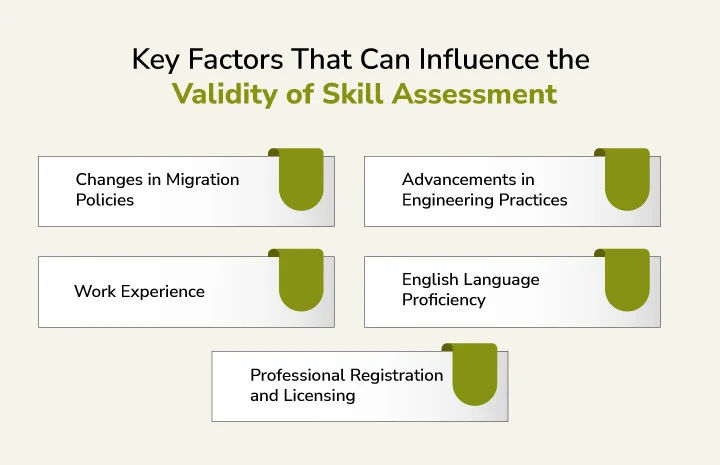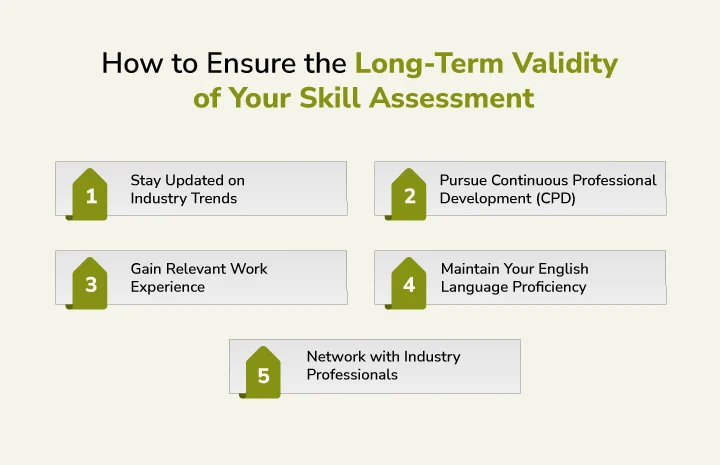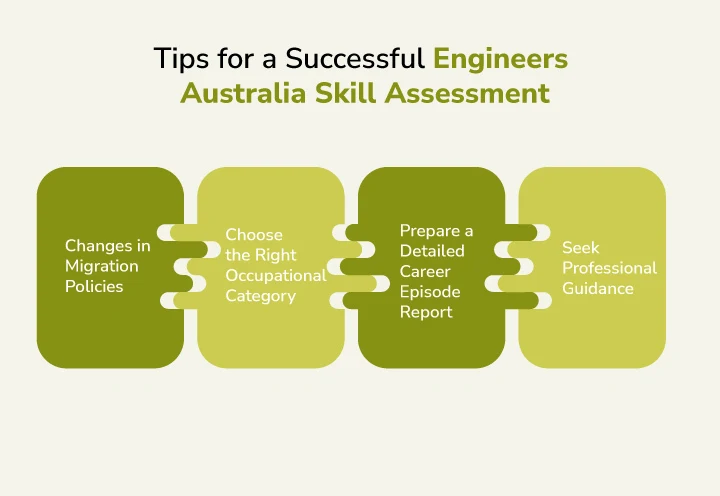What is the Validity of Skill Assessment for Engineers Australia?

What is the Validity of Skill Assessment for Engineers Australia?
When planning to migrate to Australia as a professional engineer, the Engineers Australia (EA) Skill Assessment is a crucial step. This process ensures that your qualifications and work experience align with Australian engineering standards.
However, a common question arises—“What is the Skill Assessment validity for Engineers Australia?” Understanding how long your assessment remains valid is essential for your migration planning and application timeline.
In this blog, we’ll explore the validity of Engineers Australia’s skill assessment, the factors that can influence it, and how you can ensure your assessment remains relevant throughout the visa process. We’ll also address other related aspects to help you navigate the complexities of this critical step in your migration journey.
Understanding the Engineers Australia Skill Assessment
Before diving into the validity of the Engineers Australia Skill Assessment, it’s essential to understand what the assessment includes. Engineers Australia evaluates the qualifications, skills, and experience of engineers to ensure they meet the Australian standards for professional engineering practice.
The assessment is conducted under three main occupational categories:
- Professional Engineer
- Engineering Technologist
- Engineering Associate
Each category has distinct criteria, such as educational qualifications, professional experience, and English language proficiency. The assessment process requires submitting comprehensive documents, including academic records, employment references, and evidence of English proficiency (if applicable).
The assessment result plays a vital role for engineers aiming to migrate to Australia, as it establishes their eligibility for skilled migration visas. However, the validity of the Engineers Australia Skills Assessment is not permanent, and applicants must be mindful of its restrictions and renewal conditions.
Validity of Engineers Australia Skill Assessment
The Skill Assessment Validity of Engineers Australia refers to the period during which the assessment outcome is considered acceptable for migration purposes. According to Engineers Australia, the validity of the skill assessment is three years from the date of issue.
If you plan to apply for a skilled migration visa, your assessment must be no older than three years at the time of application.
Why is the validity limited to three years?
The three-year validity period is designed to ensure that the skills and qualifications of engineers remain current and relevant. Engineering is a dynamic field, and technological advancements, industry standards, and regulatory requirements can change over time.
By limiting the validity of the Skill Assessment, Engineers Australia ensures that only those with up-to-date skills and knowledge are eligible for migration.
What Happens After the Validity Period Expires?
If your Engineers Australia Skill Assessment expires, you must submit a new application to continue with your migration plans. The reapplication process is similar to the original assessment and requires updated documents, including any new qualifications or work experience acquired since your previous assessment.
Keep in mind that reapplying can be both time-consuming and expensive, so it’s wise to plan your migration timeline carefully to prevent avoidable delays.
Key Factors That Can Influence the Validity of Skill Assessment

While the EA Skill Assessment Validity is officially three years, several factors can influence the practical validity of your assessment. These factors can determine how useful your assessment is for migration and employment purposes.
1. Changes in Migration Policies
Australian immigration policies are subject to change, and these changes can impact the validity of the Skill Assessment. For example, if the Australian government updates the skilled occupation list or introduces new visa requirements, your assessment may no longer meet the criteria for migration.
Staying informed about policy changes is crucial to ensuring your assessment remains valid.
2. Advancements in Engineering Practices
As mentioned earlier, engineering is a rapidly evolving field. If significant advancements occur in your area of expertise, your skills and knowledge may become outdated, even within the three-year validity period.
To maintain the relevance of your assessment, consider pursuing professional development opportunities, such as certifications, training programmes, or advanced degrees.
3. Work Experience
Your work experience plays a significant role in the validity of the Engineers Australia Skill Assessment. If you gain additional experience in a relevant field after your assessment, it can strengthen your case for migration.
Conversely, if you take a career break or work in an unrelated field, it may weaken the validity of your assessment.
4. English Language Proficiency
For many engineers, English language proficiency is a key requirement for the EA Skill Assessment. If your English language test results expire (typically after two years), you may need to retake the test to maintain the validity of your assessment.
Ensure that your language skills remain up-to-date to avoid complications.
5. Professional Registration and Licensing
In some cases, professional registration or licencing may be required to work as an engineer in Australia. If your assessment does not include these credentials, it may limit your employment opportunities, even if the assessment itself is still valid.
Research the specific requirements for your engineering discipline and location to ensure compliance.
How to Ensure the Long-Term Validity of Your Skill Assessment

While the EA Skill Assessment Validity is officially three years, there are steps you can take to ensure your assessment remains relevant and useful beyond this period.
1. Stay Updated on Industry Trends
Keeping up with the latest developments in your field is essential for maintaining the relevance of your skills and qualifications. Attend industry conferences, subscribe to professional journals, and participate in online forums to stay informed.
2. Pursue Continuous Professional Development (CPD)
Engaging in CPD activities, such as workshops, courses, and certifications, can help you stay current with industry standards and practices. Many professional engineering organisations offer CPD programmes that are recognised by Engineers Australia.
3. Gain Relevant Work Experience
If possible, seek out work opportunities that align with your engineering discipline and the requirements of the Australian job market. Relevant work experience not only strengthens your skill assessment but also enhances your employability.
4. Maintain Your English Language Proficiency
If English is not your first language, it’s important to maintain your proficiency through regular practice. Consider enrolling in language courses or using language-learning apps to keep your skills sharp.
5. Network with Industry Professionals
Building a professional network can provide valuable insights into the Australian engineering industry and help you stay informed about job opportunities and industry trends. Join professional associations, attend networking events, and connect with peers on platforms like LinkedIn.
Learn more: 🤩🌟 How to write a CDR report for Engineers Australia? ✍️✅✔️
Common Misconceptions About the EA Skill Assessment Validity

There are several misconceptions about the validity of the Engineers Australia Skill Assessment that can lead to confusion. Let’s address some of the most common ones.
1. The Assessment is Valid Indefinitely
As discussed earlier, the EA Skill Assessment Validity is limited to three years. After this period, you will need to reapply for a new assessment if you wish to proceed with your migration plans.
2. The Assessment Guarantees a Visa
While a positive skill assessment is a critical step in the migration process, it does not guarantee a visa. You must also meet other visa requirements, such as points-based criteria, health and character checks, and English language proficiency.
3. The Assessment is Only for Migration Purposes
While the primary purpose of the Engineers Australia Skill Assessment is for migration, it can also be useful for professional recognition and employment purposes in Australia. Many employers require a valid skill assessment as part of the hiring process.
Migration skills assessment fees
Migration skills assessment fees for the 2024 to 2025 period are set out below.
International Accords qualification assessment fees
| Item/s | Fee excl. GST AUD | Fee incl. GST AUD |
| Washington/Sydney/Dublin Accord qualification assessment | $475 | $522.50 |
| Washington/Sydney/Dublin Accord qualification assessment plus
relevant skilled employment assessment |
$880 | $968 |
| Washington/Sydney/Dublin Accord qualification assessment plus
overseas PhD assessment |
$730 | $803 |
| Washington/Sydney/Dublin Accord qualification assessment plus
relevant skilled employment assessment plus overseas engineering PhD assessment |
$1135 | $1248.50 |
Australian accredited engineering qualification assessment fees
| Item/s | Fee excl. GST AUD | Fee incl. GST AUD |
| Australian Engineering Qualification Assessment | $295 | $324.50 |
| Australian engineering qualification assessment plus
relevant skilled employment assessment |
$700 | $770 |
| Australian engineering qualification assessment plus
overseas engineering PhD assessment |
$550 | $605 |
| Australian engineering qualification assessment plus
relevant skilled employment assessment plus overseas engineering PhD assessment |
$955 | $1050.50 |
Competency demonstration report (CDR) assessment fees
| Item/s | Fee excl. GST AUD | Fee incl. GST AUD |
| Standard competency demonstration report | $880 | $968 |
| Competency demonstration report plus
relevant skilled employment assessment |
$1285 | $1413.50 |
| Competency demonstration report plus
overseas engineering PhD assessment |
$1135 | $1248.50 |
| Competency demonstration report plus
relevant skilled employment assessment plus overseas engineering PhD assessment |
$1540 | $1694 |
Additional services fees
| Item/s | Fee excl. GST AUD | Fee incl. GST AUD |
| Fast-track assessment fee (additional to MSA assessment fee) | $335 | $368.50 |
| Separate relevant skilled employment assessment | $455 | $500.50 |
| Separate overseas engineering PhD assessment | $305 | $335.50 |
| Separate relevant skilled employment assessment plus
overseas engineering PhD assessment |
$710 | $781 |
| Review fee | $315 | $346.50 |
| Appeal fee | $600 | $660 |
| Updated outcome letter | $165 | $181.50 |
| Standard administration fee | $120 | $132 |
Tips for a Successful Engineers Australia Skill Assessment

To maximise the validity of your skill assessment and ensure a positive outcome, follow these tips:
1. Submit Accurate and Complete Documentation
Ensure that all required documents, such as academic transcripts, employment references, and English test results, are accurate and complete.
2. Choose the Right Occupational Category
Select the occupational category that best matches your qualifications and experience. If you’re unsure, consult with a migration agent or Engineers Australia.
3. Prepare a Detailed Career Episode Report
The career episode report is a critical component of the assessment. Provide clear and detailed descriptions of your engineering projects, roles, and responsibilities.
4. Seek Professional Guidance
If you’re unsure about any aspect of the assessment process, consider seeking guidance from a registered migration agent or professional consultant.
Conclusion
The Engineers Australia Skill Assessment Validity is a crucial consideration for engineers planning to migrate to Australia. While the assessment is valid for three years, several factors can influence its practical validity, including changes in migration policies, advancements in engineering practices, and work experience.
By staying informed, pursuing continuous professional development, and maintaining your skills and qualifications, you can ensure that your assessment remains relevant and useful for migration and employment purposes.
Whether you’re just starting the assessment process or preparing to reapply, understanding the EA Skill Assessment Validity and its implications is essential for a successful migration journey.
With careful planning and preparation, you can navigate the process with confidence and achieve your goal of working as an engineer in Australia.
FAQs
1. How do I renew my engineering skills assessment in Australia?
To renew your engineering skills assessment, check the expiry date, update your documentation and continuing professional development (CPD), and submit a new application along with the required fee.
2. What is next after skill assessment in Australia?
After receiving a positive skills assessment, you can proceed to apply for a visa to migrate to Australia, using the assessment outcome letter as part of your application.
3. How do I know if my assessment is valid?
You can verify the validity of your assessment by checking the expiry date on your outcome letter and ensuring it falls within the acceptable timeframe for visa applications.
4. What is a good score for a skills assessment?
A good score for skills assessment typically aligns with the requirements set by Engineers Australia, which may vary depending on the engineering discipline. Aim for a score that meets or exceeds the minimum criteria for your specific assessment pathway.
5. How much is an Engineers Australia assessment?
The fees for an Engineers Australia assessment depend on the type of assessment and any additional services you may require. For example, the cost for a Washington/Sydney/Dublin Accord Qualification Assessment is approximately AUD 480.70 inclusive of GST.
5. Can I do a skill assessment without work experience?
It is generally required to have work experience for a skills assessment. However, if you lack work experience, you may still be able to demonstrate your competencies through alternative means, depending on the specific requirements of Engineers Australia.
6. How do I know if my assessment is valid?
To confirm the validity of your assessment, check the expiry date on your assessment outcome letter. You can also verify its status through the Engineers Australia portal.
